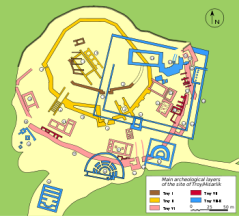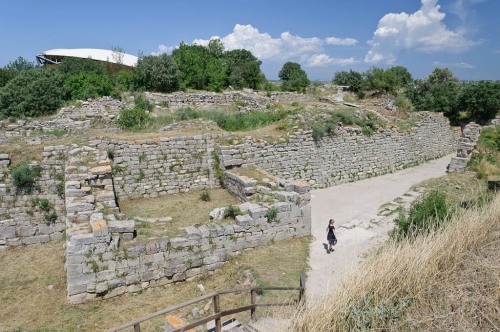The Lost Media of Troy
by Evs
My fascination with the ancient city of Troy is long standing. I was first introduced to the legend of Troy while reading the Odyssey in high school, but my real interest in this tale was really piqued about ten years ago when I by chance got my hands on a digital copy of a fantastic 6-part documentary series all about the myths and stories surrounding Troy and the modern day archeology of the site.

Troy was an important bronze age city and the setting of Homer’s poem Illiad and part of the Odyssey. It was the site of the famous Trojan War, fought between Greeks and Trojans in approximately 1250 BC. The end of this war came when the Trojans lost and the city was razed. Despite this bronze age calamity, the site actually remained occupied by number of different peoples until the 4th century AD. Eventually, though, the city was completely abandoned, buried and lost to the world. It’s very existence was debated throughout Age of Enlightment; many thought that it was simply the fiction of an ancient poet. However, with its re-discovery by German Archeologist Heinrich Schliemann in the 1870s, the city was pulled out of the myth and placed back into the real history books.
One of the most unique aspects of the city of Troy is that it owes its modern fame and its rediscovery almost entirely to oral tradition. While some ancient written records and real world artifacts referring to the city have been discovered, these are few and somewhat unexceptional. The only reason we all know the name Troy is that the famous hexametric poem describing its demise, deeply rooted in bardic tradition, was passed down through the generations.
It was lucky too, since the very survival of bardic poems depends entirely on bards memorizing them, reciting them and teaching them to the next generation of bards. If the stories are not passed on, then the story dies with the bard. There is no way of retrieving it afterwards. There is no back-up record. I would assume, lesser poems rooted in the oral tradition would struggle to survive past a single generations let alone hundreds of years. Just imagine how easily the story of Troy could have been lost to the world forever.
 Now the documentary I had on my computer was old-school, british, and somewhat academic. Sure it was made in the 80s and had a dated style. But it was very special.
Now the documentary I had on my computer was old-school, british, and somewhat academic. Sure it was made in the 80s and had a dated style. But it was very special.
It did something many documentaries don’t: it explored the myth and the history of Troy in a global and intemporal context rather than within its own simple linear history. The documentary melded ancient history with modern history. It described the beginnings of archaeology as a science and the context in which the great excavators of the site were working. It explored the universal experience of war: from Troy to the World Wars to the Cold War, and the tragedy that befalls all involved. It even gave me my first look at the divided city of Berlin in the 80s, where part of the documentary was shot, and drew a connection between the futility in the Greek’s search for military greatness at Troy and the militarized East Berlin. Such a series would never fly on TV today. I loved it.
But a year or so later, between a move, a computer clean up and reformat, and a transfer of all my data to a secondary hard drive, I lost the files. Poof! Just like that, I no longer had access to this story… and for the life of me I couldn’t remember the name of the series or of the guy who had made it.
Time passed but I would still think about this series from time to time. I would mention it at dinner parties, and ask friends if they remembered anything about it. I would hum the theme music while suffering through terrible History Channel pablum, wishing I could find this documentary again.
About 6-7 years went by and nothing. It was as though this modern telling of the story of Troy had been lost (to me) forever.
Then, about 2 years ago, I was working at a tech company dealing primarily with music and video. At our office, we had shelves full of DVDs from all over europe, to which we had free access. After blowing though my favorite tv shows, I started to check out some of the BBC documentaries. One day I stumbled upon a show called “The Story of India” by Michael Wood. I watched it and liked it enough that I next went for a box-set called “The Michael Wood collection” which contained older documentaries by Michael Wood.
The first doc that caught my eye was entitled “In Search of the Trojan War“. I put on the DVD and started watching. Then about a minute in, the opening credit started and I gasped … The Thunder. The Music. The repeating loop of an armored soldier cutting down air with a giant sword, in front of the flames of war. The awkwardly posed and spinning image of Helen of Troy – topless and transposed with footage of a cloudy windy sky. My old long lost documentary about Troy! I had found it! Finally I knew who it was that had originally sparked my interest in homeric history and the story of Troy. Michael Wood! I love you!
All of Michael Wood’s documentaries are great but “In Search of the Trojan War” is really his most inspired work. After watching the series, I re-read the Odyssey and sped through the Illiad. I even cracked Ovid ‘s Metamorphoses in hope that it would tell me more of the myth of the Trojan Horse … which it didn’t. Turns out the horse bit is found in Virgil‘s Aeneid not Ovid. Crap.
We travelled around Greece soon after, where we imagined ourselves amateur archeologists, like Michael Wood exploring the greek sites mentioned in The Illiad.

This year with our trip to Turkey and to the site of Troy itself, we finally got to see the real place first hand. Many people told us not to bother with the site at Troy, that it was a confusing and crowded site. But our experience was completely the opposite. We were lucky to be there in May on a weekday. We went around noon, right when the first round of busses had left and before the next one arrived. The site is challenging, because the history is challenging. Troy was an occupied site over the span of more than 2500 years. And all these layers of occupation were built on top of the last. Talk about a cross section in human history!
Since our trip there, we have also discovered a new documentary about Troy, with updates to the story that Michael Wood tells. It doesn’t quite have the charm of “In Search of the Trojan War” but it is well worth a watch!
As you can imagine, we loved Troy, but we also knew what to expect. It takes a slightly trained eye to make sense of the jumble of human history on that site. I recommend that if visit this site one day you take a look at Michael Wood’s documentary first.

The citadel walls of Troy VI
I want to end this post with a little survey of the media through which the story of Troy was transmitted because, as the title suggests, this is one of the most incredible parts of the story of Troy.
The first inception of the story was told by the witnesses to the events of the Trojan war which occurred around 1250 BC. These stories were then compiled by anonymous poets and bards who passed down multiple (and likely contradictory) versions of this important event for about 400 years. Then around 850 BC Homer is said to have compiled the story into a single poem, however it is unlikely that he wrote it down. Then this too was likely passed down for over 100 years through spoken word. It was only written down on papyrus for the first time between 700 BC and 400 BC. Later, the story was translated into Latin and other world languages and eventually copied into books. In the 17th century, it was finally printed on a mass scale thanks to the advent of the printing press. These books influenced Schliemann (working in the 1870s) to search for the city behind the myth. The printed version of Illiad and the discovery and subsequent archeological study of Troy influenced Michael Wood to make a documentary for the BBC about the site and the story in 1985. The show aired on television and then was released on VHS. It was then converted into digital form in the early 2000s, shared across the internet, and finally ended up on my computer – which is how the story reached me. And to think I almost lost it!
It is an amazing journey of the story of one single event, transmitted through multiple mediums – from the witness accounts of a bronze age war to a digital file consisting of 1s and 0s – and spanning around 3250 years.
This is what I call epic.
great read! inciteful, interesting of course, but mostly Eyeopening…your previous blog about Istanbul and Bodrum also great. looking forward to the next installment…
why thank you 🙂
I first watched the series 8 years ago and loved it. It was an amazing journey from Troy to Berlin from Mycenae to Eastern Turkey. Archaeology, oral tradition, wars, myths and various other aspects of this subject were analysed. It might be 30 years old but it is still far better than many other modern documentaries. It surely is not dated! @ArchaeoTurkey
Thanks for your comment! It really is a great piece of historic documentary.
I own a copy now and often lend it to friends. It is a great way to introduce people to the world of history!